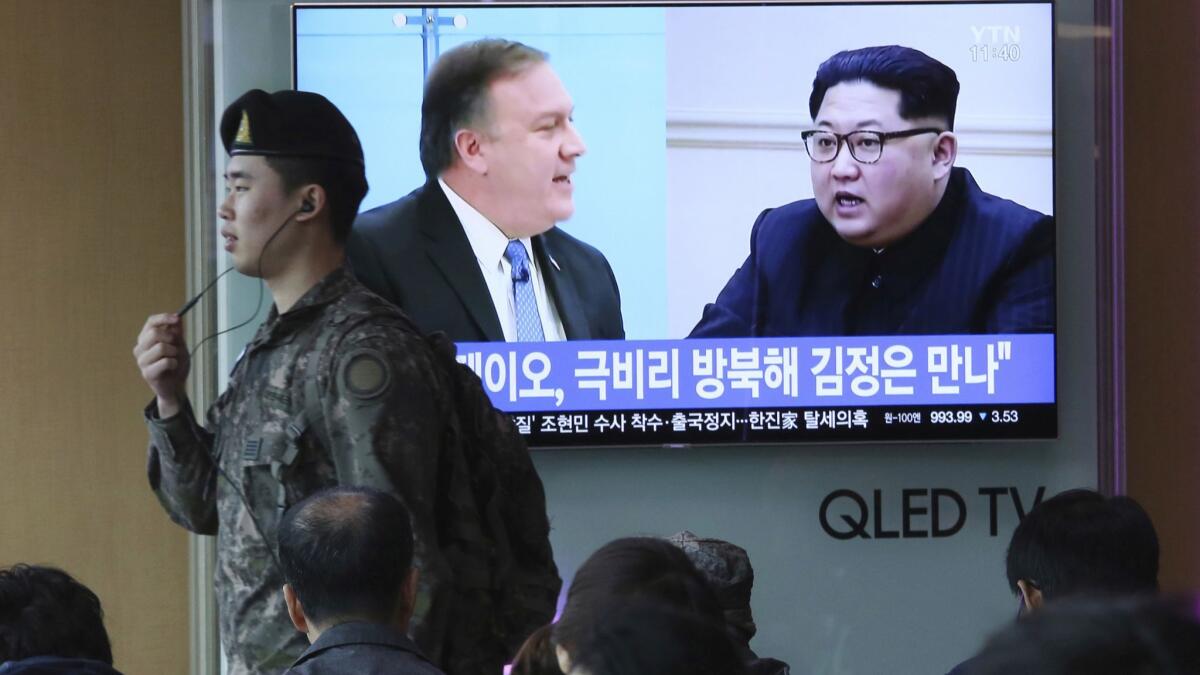South Korea to seek formal peace agreement with North at upcoming summit

Reporting from Seoul â As details about CIA Director Mike Pompeoâs visit to North Korea were confirmed by President Trump on Twitter on Wednesday, South Korea said it would seek to establish a peace agreement with the totalitarian state in the upcoming summit between their leaders this month.
South Koreaâs national security advisor, Chung Eui-yong, made the statement about the potential for a formal end to the Korean War to reporters Wednesday. The announcement followed President Trumpâs comments on the North Korea situation as he held talks at his Mar-a-Lago resort in Florida with Japanese Prime Minister Shinzo Abe.
Hostilities in the conflict ended in 1953 with the signing of an armistice agreement, but the North and the South remain technically at war.
Chung was part of a delegation that met with Trump at the White House in March and announced the possibility of a historic summit between the president and Kim Jong Un, the third-generation dynastic leader who has overseen North Koreaâs rapid advancement as an emerging nuclear state.
The national security advisor told reporters in South Korea that he recently talked with his new U.S. counterpart, John Bolton, about the possibility of establishing a peace agreement between Seoul and Pyongyang.
Chungâs precise words, delivered in Korean, were difficult to translate, but his office said he used the term âpeace regimeâ or âpeace systemâ rather than âtreaty.â Some experts said that meant a broader structure to maintain peaceful relations.
âThis is because Seoul has long believed that a peace treaty isnât enough to sustain peace and that they need a comprehensive mechanism or system for peace that will guarantee that the Cold War structure is abolished forever,â said Duyeon Kim, a visiting senior research fellow at the Korean Peninsula Future Forum in Seoul.
Chung said the pair âdiscussed, in depth, ways to establish a peace system through prohibition of any provocation on the peninsula, to address concerns North Korea may have, and to ensure a bright future to North Korea if it makes the right decision.â
North Korea experts said such an agreement could be tricky given the international structure of the armistice, signed in 1953, that involved China, North Korea and the United Nations forces commanded by a U.S. general.
âSouth Korea has no official capacity to sign any agreement that abrogates the armistice agreement,â said Bong Youngshik, a research fellow at Yonsei Universityâs Institute for North Korean Studies in Seoul. âBut an âagreementâ is possible at the summit.â
Bong said he was referring to a deal involving a nonaggression pact between the two nations, something thatâs been discussed in the past.
Duyeon Kim said the North and the South could revisit a scenario, envisioned years ago, about a bilateral peace agreement â and then having China and the United States use it to replace the armistice.
The rapid pace of developments ahead of the summit between Kim and South Korean President Moon Jae-in worries some experts, such as Robert Kelly, a political science professor at Pusan National University in South Korea.
He remains concerned that North Korea might get rewarded, despite repeated and internationally condemned provocations involving its nuclear and missile programs in 2017, because the timeline to achieve something is so compressed. âWhat is Moon ready to concede given this kind of talk? And how come we have no idea what the North is going to bend on? Iâm just worried Moon is so anxious for a deal, that heâll give away too much,â he said.
Meanwhile, Moonâs summit planning committee released details Wednesday night about the protocol, security and media issues related to the upcoming meeting, set for April 27 at Panmunjom, a diplomatic outpost along the highly fortified border separating the two countries.
For example, the North and the South have agreed to broadcast major parts of the summit live, including the first handshake of the leaders, ending some speculation about what parts of the meeting might be visible to the public.
Stiles is a special correspondent.
More to Read
Sign up for Essential California
The most important California stories and recommendations in your inbox every morning.
You may occasionally receive promotional content from the Los Angeles Times.











